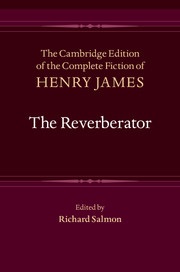Book contents
- Frontmatter
- Contents
- List of Illustrations
- Acknowledgements
- List of Abbreviations
- General Editors’ Preface
- General Chronology of James’s Life and Writings
- Introduction
- Textual Introduction
- Chronology of Composition and Production
- Bibliography
- The Reverberator
- Glossary of Foreign Words and Phrases
- Notes
- Textual Variants I : Substantive Variants up to Copy Text
- Textual Variants II : Substantive Variants after Copy Text
- Emendations
- Appendices
II
Published online by Cambridge University Press: 23 April 2021
- Frontmatter
- Contents
- List of Illustrations
- Acknowledgements
- List of Abbreviations
- General Editors’ Preface
- General Chronology of James’s Life and Writings
- Introduction
- Textual Introduction
- Chronology of Composition and Production
- Bibliography
- The Reverberator
- Glossary of Foreign Words and Phrases
- Notes
- Textual Variants I : Substantive Variants up to Copy Text
- Textual Variants II : Substantive Variants after Copy Text
- Emendations
- Appendices
Summary
THE court was roofed with glass; the April air was mild; the cry of women selling violets came in from the street and, mingling with the rich hum of Paris, seemed to bring with it faintly the odour of the flowers. There were other odours in the place, warm, succulent and Parisian, which ranged from fried fish to burnt sugar; and there were many things besides: little tables for the post-prandial coffee; piles of luggage inscribed (after the initials, or frequently the name, R. P. Scudamore or D. Jackson Hatch), Philadelphia, Pa., or St. Louis, Mo., rattles of unregarded bells, flittings of tray-bearing waiters, conversations with the second-floor windows of admonitory landladies, arrivals of young women with coffin-like bandboxes covered with black oilcloth and depending from a strap, sallyings forth of persons staying and arrivals, just afterwards, of other persons to see them; together with vague prostrations on benches of tired heads of American families. It was to this last element that Mr. Dosson himself in some degree contributed, but it must be added that he had not the extremely bereft and exhausted appearance of certain of his fellows. There was an air of meditative patience, of habitual accommodation in him; but you would have guessed that he was enjoying a holiday rather than panting for a truce, and he was not so enfeebled but that he was able to get up from time to time and stroll through the porte cochère to have a look at the street.
He gazed up and down for five minutes, with his hands in his pockets, and then came back; that appeared to content him; he asked for very little— had no restlessness that these small excursions would not assuage. He looked at the heaped-up luggage, at the tinkling bells, at the young woman from the lingère, at the repudiated visitors, at everything but the other American parents. Something in his breast told him that he knew all about these. It is not upon each other that the animals in the same cage, in a zoological collection, most turn their eyes.
- Type
- Chapter
- Information
- The Reverberator , pp. 13 - 23Publisher: Cambridge University PressPrint publication year: 2018

